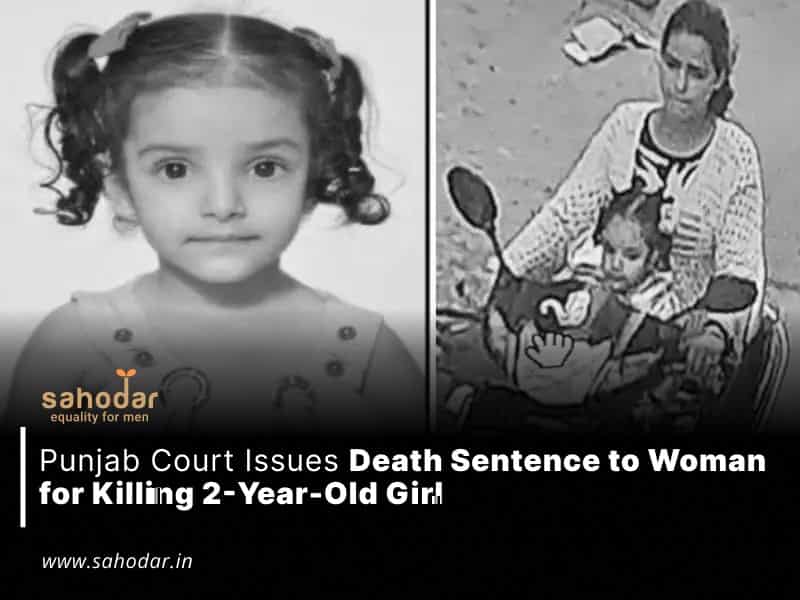The child, who was two years and nine months old, was abducted by Neelam in November 2021 when she was playing on the street outside her home.
A 33-year-old woman in Ludhiana, Punjab, was handed a death sentence by Sessions Judge Munish Singal on Thursday for the brutal murder of 2-year-old Dilroz Kaur in 2021. Judge Singal emphasized that the convict, Neelam, had displayed extreme cruelty and committed the crime in a barbaric manner, surpassing all bounds of decency.
“There cannot be more graver, heinous and barbaric crime than burying alive a girl of tender age of 2-3/4 years of age who must not have understood the acts of her next door neighbour,” the Court said.
The report additionally observed that according to the CCTV footage, Kaur appeared cheerful and lively while standing in front of the Scooty being driven by the convict.
“The small child must be thinking that her aunt whom she used to call ‘Bua’ was taking her on a joyride or perhaps going to buy some goodies for her. Little did she know she had been kidnapped by her aunty whom she trusted and she had no idea that her life was going to end soon. In fact the tender child of 2-3/4 years does not even know about life or death. She must have been totally confounded when convict Neelam was stuffing sand into her mouth and burying her upside down into a pit,” the Court observed.
In November 2021, Neelam abducted a child who was two years and nine months old while the child was playing on the street near her home.
Last year, Neelam, who abducted and subsequently killed the child, was officially charged.
Throughout the trial, the Prosecution informed the Court that the accused had meticulously planned the murder, having previously visited the site where the victim was later found buried and had already dug the pit.
According to court records, the location where the victim’s body was buried was approximately 12-13 kilometers away from where the abduction occurred. The accused refuted the allegations, asserting that she was falsely accused in the case.
In the verdict announced on April 12, the Court, basing its decision on witness testimonies, determined that Neelam was seen with the victim shortly before the murder and that the victim’s body was discovered soon after.
“The accused has to establish as to how and when she released minor Dilroz from her custody and in the absence of any such proof produced by the kidnapper, it would be obviously presumed that Neelam (kidnapper) continued with the custody of Dilroz (kidnapped), till she was eliminated,” the Court said.
The Court additionally discovered that sand had been placed in the child’s mouth before she was buried.
“[The] girl child must have died within few seconds due to asphyxia when her mouth and nostrils were stuffed with sand by the accused and in this forcible process, sand particles must have reached her lungs and trachea leading to suffocation and choking,” it observed on the basis of the testimony given by doctors.
Regarding the motive for the murder, the Court observed that the accused, a divorced individual with two children, resided in close proximity to the victim. It concluded that feelings of jealousy, inferiority, and animosity towards the neighbor and his children provided a compelling motive for the crime.
The Court also considered the extrajudicial confession made by the accused as significant evidence in her conviction, deeming it well-substantiated.
During the sentencing hearing on Thursday, the Prosecution advocated for the death penalty, asserting that the convict Neelam posed a threat to society.
Conversely, the defense counsel argued that the accused, a mother of two from a socially and economically disadvantaged background, should be considered differently.
The Court deemed the manner in which the murder was carried out to be exceptionally egregious, qualifying it as a “rarest of rare” case eligible for the death penalty.
Furthermore, the Court noted the absence of any remorse or repentance from the accused during her time in custody, citing reports from both jail authorities and the Secretary of the District Legal Services Authority in Ludhiana.
“Ld Counsel for the convict argued that leniency be shown to the convict who was a woman and there was possibility of her reformation. I have considered this much stressed argument but I am not convinced with the same because merely being woman is not the mitigating circumstance in her favour,” the Court said.
The Court concluded that the accused lacked any mitigating factors and exhibited a deficiency in basic human values or psyche that could facilitate any potential reformation.
In sentencing the convict to death, the Court remarked, ‘The act of murdering a young girl by burying her alive is a grievous violation of human values, shattering the trust of neighbors and undermining faith in humanity.

